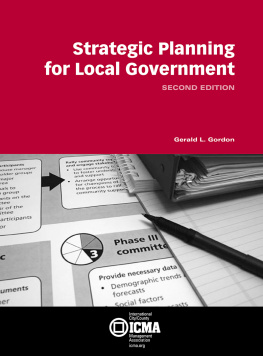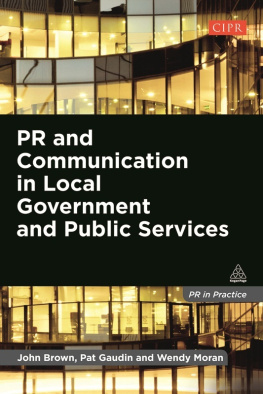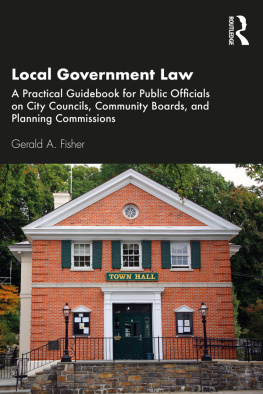Strategic Planning
for Local Government
SECOND EDITION
Gerald L. Gordon

ICMA Textbooks
Advanced Supervisory Practices
Budgeting: A Guide for Local Governments
Capital Budgeting and Finance: A Guide for Local Governments
Economic Development: Strategies for State and Local Practice
Effective Communication
The Effective Local Government Manager
Effective Supervisory Practices
Emergency Management
The Future of Local Government Administration: The Hansell Symposium
Human Resource Management in Local Government: An Essential Guide
Local Government Police Management
Management Policies in Local Government Finance
Managing Fire and Rescue Services
Managing Human Resources: Local Government Cases
Managing Local Economic Development: Cases in Decision Making
Managing Local Government: Cases in Decision Making
Managing Local Government Finance: Cases in Decision Making
Managing Small Cities and Counties
The Practice of Local Government Planning
The Practice of State and Regional Planning
Service Contracting: A Local Government Guide
Library of Congress Cataloging-in-Publication Data
Gordon, Gerald L.
Strategic planning for local government / by Gerald L. Gordon.2nd ed.
p. cm.
ISBN 978-0-87326-784-7
1. Local government--United States. 2. Strategic planningUnited States. I. Title.
JS356.G66 2005
352.34214--dc22
2005006217
Copyright 2005 by the International City/County Management Association, 777 North Capitol St., N.E., Suite 500, Washington, D.C. 20002. All rights reserved, including rights of reproduction and use in any form or by any means, including the making of copies by any photographic process; or by any electronic or mechanical device, printed, written, or oral; or recording for sound or visual reproduction; or for use in any knowledge retrieval system or device, unless permission in writing is obtained from the copyright owner.
Printed in the United States of America.
09 08 07 06 05
5 4 3 2 1
Design: Will Kemp
About ICMA
The International City/County Management Association (ICMA) is the professional and educational organization for appointed managers and administrators serving cities, towns, counties, regional entities, and other local governments throughout the world. The mission of ICMA is to create excellence in local governance by developing and fostering professional local government management and leadership worldwide. To further this mission, ICMA develops and disseminates new approaches to management and leadership through training programs, information services, and publications.
Local government managers and administratorscarrying a wide range of titlesserve at the direction of elected councils and governing boards. ICMA serves these managers and local governments through many programs that aim at improving the managers professional competence and strengthening the quality of local governments. While ICMA recognizes professional management in all forms of local government, ICMAs origins lie in the council-manager form of local government, which combines the strong professional experience of an appointed local government manager or administrator with the strong political leadership of elected officials in the form of a council, board of selectmen, or other governing body.
ICMA was founded in 1914, adopted its Code of Ethics in 1924, and established its Institute for Training in Municipal Administration in 1934. The Institute provided the basis for the Municipal Management Series, popularly knows as the ICMA Green Books. By 1994, the institute had evolved into the ICMA University, which provides professional development resources for members and other local government employees.
ICMAs programs and activities include providing professional development; establishing guidelines for voluntary credentialing and standards of ethics for members; managing a comprehensive information clearinghouse; conducting local government research and data collection and dissemination; providing technical assistance; and producing a wide array of publications focused on local government management issues, including Public Management magazine, newsletters, management reports, and texts. ICMAs efforts toward the improvement of local governmentas represented by this bookare offered for all local governments and educational institutions.
Acknowledgments
This volume was a labor of love. Municipal strategic planning is a process in which I have been engaged throughout the United States and the world for more than thirty years. I have been a practitioner, a lecturer, a professor, and a consultant on the subject. And every time I get involved in a community, I learn a lot of new things about strategic planning. Every situation and every community is different. The issues are different, the stakeholders are different, and, hence, the process is different. This book is a guide. It requires exceptional professionals and active citizens to conduct strategic planning exercises successfully in their communities.
In recognition of the need for strength in numbers and a diversity of perspectives, I asked a number of public officials from across the United States to serve as an advisory committee in the conduct of this research and the writing of this book. Not only was their collective counsel invaluable, it also directed me to include concepts and issues that greatly strengthened the product and make it a far greater tool for local government leaders.
Although I have met some of these exceptional men and women only through telephone conversations and e-mail exchanges, they feel like friends. Moreover, they personify the exceptional qualities and capabilities of todays officials in Americas cities, towns, and counties.
Jane Bais DiSessa, city manager, Berkley, Michigan
Michael Freeman, regional partner, HDR, Inc., Fort Collins, Colorado
Richard Kirkwood, city manager, Woodland, California
Robert A. Stalzer, deputy county executive for planning and development, Fairfax County, Virginia
Susan Thorpe, former city manager, Rowlett, Texas
Amy Vansen, city planner, Berkley, Michigan
Gerald L. Gordon, Ph.D.
May 2005
Preface to the Second Edition
In 1993, the International City/County Management Association (ICMA) published my volume, Strategic Planning for Local Government. That text described the process of strategic planning as it had been practiced in the private sector for many years and the successes of city and county leaders who applied those practices to the public sector as well. At that time, although some governments were well versed in the concepts of strategic planning and had achieved significant results, these governments were few and far between. Other local governments were just beginning to acknowledge the applicability of strategic planning to local issues, but most local governments had not yet focused on the benefits that could be derived from such a process. In 1993, developing and pursuing a longer-term vision was the stuff of political rhetoric and theory and was thought to represent a less-than-critical demand on peoples time.
For the 1993 edition, approximately 40 strategic plans were collected from across the United States, and positive examples were selected for that book. Sections of plans, entire plans, and descriptions of planning processes were drawn from municipalities throughout the countrynorth, south, east, west; urban, suburban; large, small; thriving economies and struggling.
Lessons from 1993
Next page












